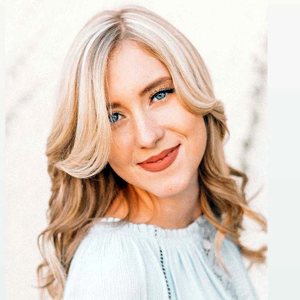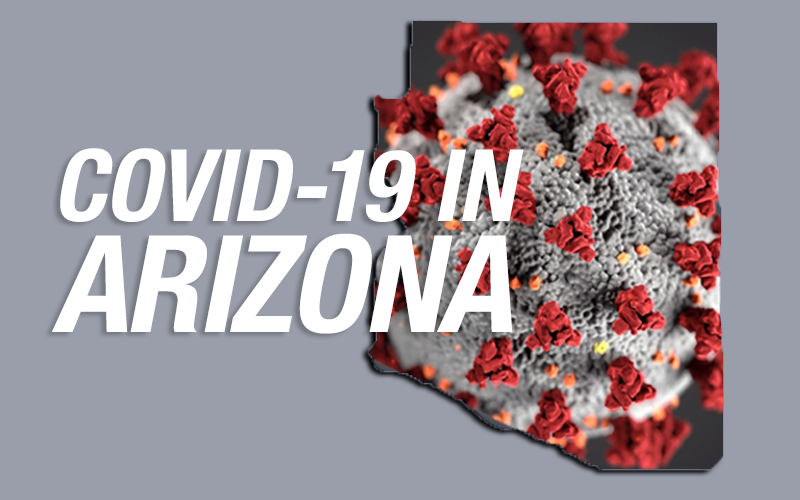PHOENIX – Hundreds of protesters gathered Monday in a so-called Patriots Rally, waving signs and cheering as speakers near the state Capitol demanded that Gov. Doug Ducey reopen the state despite the COVID-19 pandemic.
Most of the participants in the rally at Wesley Bolin Memorial Plaza, which was organized by a Facebook group called Operation Gridlock, disregarded the advice of health experts to wear face masks, keep at least 6 feet apart and avoid groups larger than 10. The rally followed a smaller gathering Sunday at the Capitol calling on Ducey to “flip the switch” and restart public life.
“We need to move forward in faith and not fear. And we can’t wait around for perfect numbers to be zero,” protester Kristen Jones told ABC15. “I think the people should be able to choose what reopens, not the government.”
Jones said she is grateful for government efforts to protect vulnerable small businesses, but “business owners should be able to choose if they reopen or not.”
The call to reopen the economy comes the same day Arizona topped 5,000 confirmed cases of COVID-19, with 187 deaths.
Ducey, in a tweet Monday, said he wants to “reenergize the economy when it’s safe to do so,” adding that he could extend the April 30 end of his stay-home order if conditions aren’t right by then.
President Donald Trump has pushed states to begin reopening their economies beginning May 1, but the administration has left that decision largely to governors to make on a state-by-state or, if needed, a county-by-county basis. Over the weekend, however, Trump sent a series of tweets to “LIBERATE” certain states.
The White House last week issued a detailed set of guidelines for states that call for a phased approach, beginning with a 14-day decline in new hospitalizations. Lawmakers in Congress also are pushing plans – all of which call for a cautious, step-by-step approach to reopening the economy, to keep from triggering a second surge of the disease.
Dr. Nicholas Vasquez, an emergency room physician in Gilbert and Chandler, warned that without certain precautions, these rallies in Arizona and in other parts of the country could lead to a second wave of infection.
“And that second wave means we’ll have to re-shut down the economy,” Vasquez said.
On Monday, the bipartisan Problem Solvers Caucus released its Back to Work Checklist of public health benchmarks to get the economy started again while protecting public health.
“The process we’re going through right now helps us learn the lessons of before: that’s working with one another, not against one another and working as Americans towards the common good. We can do this,” Rep. Tom O’Halleran, D-Sedona, said during a caucus call Monday morning. He’s among those lawmakers the president has selected to help reopen American businesses. The 50-member caucus said it has shared its plan – which calls for rapid testing, establishing layouts for workspaces to maintain social distancing and containing viral hotspots, among other steps – with congressional leaders and the White House.
As of Monday, April 20, the Arizona Department of Health Services reported 5,064 cases of COVID-19 and 187 deaths in the state. It said 54,500 tests for COVID-19 have been completed as of Monday in public and private labs in Arizona, and results were negative in 49,924 cases.
Arizona needs to double up on testing, expert says
With fewer than 60,000 tests done in Arizona – which has more than 7 million residents – experts say the state might not be testing enough to reopen safely. Arizona would need to double its current testing per month to gain certainty, William Haseltine, president of ACCESS Health International, told azcentral.com on Sunday.
“It just isn’t going to work unless you have crystal clear data,” Haseltine said. “If Arizona doesn’t have that, they are miles away from being prepared to reopen.”
Scare water hampering Navajo Nation during pandemic
Water shortages on the Navajo Nation Reservation may be contributing to the spread of COVID-19, experts say. The official tribal tally reveals at least 15% of homes have no running water at all in Navajo Nation, according to azcentral.com.
“It’s really hard for families who don’t have access to water or wastewater facilities,” said Jason John, director of the tribe’s Department of Water Resources. “They tell you to wash your hands for 20 seconds, but people can’t even do that.”
$50,000 donation from health insurers
Ducey announced Monday that a $50,000 donation from the Blue Cross/Blue Shield of Arizona will go to the AZ Coronavirus Relief Fund. The health insurers previously donated almost 1,000 N95 masks to the Arizona Department of Health Services, along with other face mask donations to Arizona food banks, grocery stores and school districts, according to the press release.
Execution drugs for the prisoners used for COVID-19 patients
Doctors are facing issues from states with the death penalty when it comes to using certain “execution drugs” to save the lives of COVID-19 patients, Cronkite News reports. COVID-19 patients that are relying on ventilators in intensive unit cares could use the sedative and paralytic drugs, frontline ICU doctors and other public health experts said in an open letter April 9 to Arizona and 16 other death penalty states. Arizona corrections officials said they don’t have any of the needed drugs.
Will warm weather and humidity slow COVID-19?
Trump in February stated that the novel coronavirus that causes COVID-19 would “go away in April, with the heat” but new research doesn’t share his certainty, Cronkite News reports. “Summer may not save us, and repeated periods of social distancing may be needed to keep serious cases from overwhelming the hospital system,” Harvard researchers wrote.
How to help
Because masks are in high demand, the Banner Health Foundation is accepting donations on homemade masks for team members and patients. There are four dropoff locations: two in Tempe, one in Tucson and one in Payson. Find more information here.
-Cronkite News reporter McKenzie Sadeghi contributed to this report.



